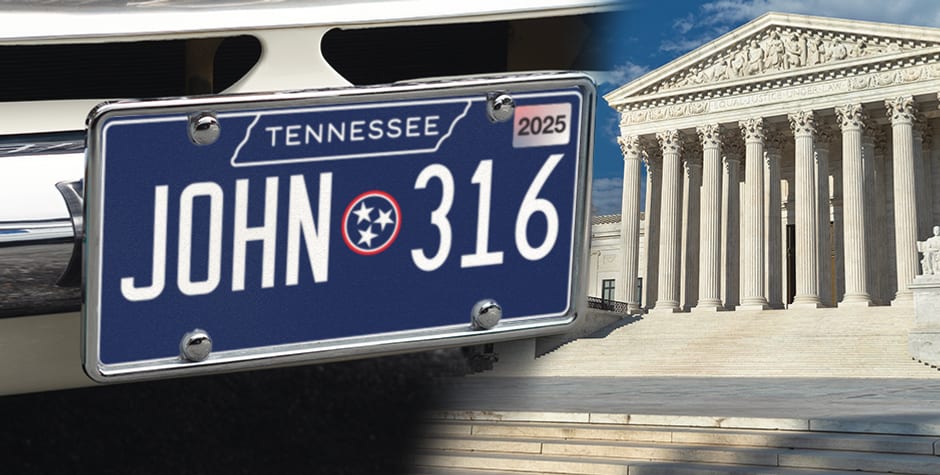Supreme Court To Decide If Your Vanity License Plate Is Free Speech – Here's Why It Matters
Listen tothis article
The ACLJ has filed a critical amicus brief with the Supreme Court in Gilliam v. Gerregano, a case that could determine whether the government can silence conservative voices by simply claiming ownership over their speech. This isn’t just about one license plate – it’s about protecting every conservative American’s right to express their deeply held beliefs without government interference. Our brief urges the Supreme Court to take the case and clarify the need to protect First Amendment expression.
The case concerns vanity license plates that represent private expression, not government speech. Like most states, Tennessee operates a system with personalized license plates where vehicle owners choose their own alphanumeric patterns, subject only to basic technical constraints and decency standards. Unlike specialty license plates that feature government-selected designs promoting state messages, vanity plates invite unlimited individual creativity.
The legal issue is straightforward but consequential: If states can silence disfavored viewpoints by claiming ownership over platforms they’ve opened to public expression, conservative voices across America face unprecedented threats to their constitutional rights.
We need you to stand with us in this legal effort. Sign our petition: Stop Government Harassment and Discrimination Against Christians.
While this particular case arises from Tennessee, the real concern isn’t Tennessee’s intentions, but rather how hostile jurisdictions nationwide, such as California, New York, and other liberal states, could weaponize an expansive government speech doctrine to silence conservative viewpoints they find objectionable.
For decades, conservative Americans have used personalized license plates to share pro-life messages, religious convictions, and support for traditional values. But now, states are increasingly trying to silence these expressions by claiming they represent “government speech” – a dangerous doctrine that could gut First Amendment protections for conservative viewpoints.
The ACLJ has witnessed this troubling trend firsthand. We’ve successfully defended religious liberty in landmark Supreme Court cases, such as Lamb’s Chapel v. Center Moriches School District, where we’ve seen government entities attempt to evade constitutional scrutiny by claiming ownership over private expression. The government speech doctrine, while legitimate in certain contexts, cannot become a shield for viewpoint discrimination against conservative beliefs.
Pro-Life Expression Under Attack
Conservatives and Christians have long used vanity license plates to share their pro-life convictions. Across America, you’ll find plates declaring “PRO LIFE,” “PSALM39,” “LFE WINS,” “PRY4LFE,” and countless other expressions of faith and conviction about the sanctity of human life. These aren’t government messages – they’re deeply personal declarations of belief that deserve robust First Amendment protection.
But if states can claim ownership over vanity plate messages, every pro-life expression becomes suspect. When the government overreaches by claiming ownership over individual speech, it threatens the very foundations that protect pro-life Americans’ ability to speak their conscience publicly.
Religious Liberty at Risk
The implications extend far beyond license plates – religious liberty is at stake. Consider the possibilities: Could public universities claim that Christian student organizations represent government speech and therefore regulate their religious messages? Could parks departments control the content of prayer rallies by asserting government ownership? Could school districts silence conservative valedictorians by claiming their addresses constitute government speech?
The ACLJ has fought these battles before. In Lamb’s Chapel, we secured unanimous Supreme Court recognition that even on government property, access to forums cannot be limited based on viewpoint discrimination. This principle becomes meaningless if the government can evade it by simply claiming ownership over private expression.
Traditional Values Under Siege
Conservative Americans also use vanity plates to celebrate traditional values: support for law enforcement (“BACKBLU”), military appreciation (“HERO VET”), Second Amendment rights (“2DAMEND”), and family values (“MOM4EVR”). These personal convictions reflect the diverse conservative movement across America.
But the government’s expanding claim over “government speech” threatens all these expressions. When states approve thousands of personalized plates celebrating every conceivable viewpoint, they create forums for individual expression. They cannot then selectively silence messages by claiming sudden ownership over the very platform they opened to public participation. And these First Amendment rights need to protect everyone.
Standing for Constitutional Principles
The ACLJ’s brief makes clear that when the government “abandons substantive control over messaging and instead facilitates a platform for personal expression, the resulting speech is of the individual speakers, not the State.” This principle doesn’t just protect vanity plates – it protects every conservative American’s right to express their values without government interference.
The Supreme Court should reject the dangerous expansion of the government speech doctrine and reaffirm that individual expression deserves robust constitutional protection.
